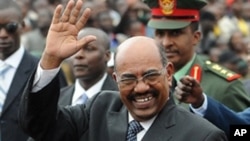Kenya has rejected international criticism over the inclusion of Sudanese President Omar al-Bashir in Friday's Promulgation Day festivities. The east African nation has defended its actions as necessary for regional stability and national security.
At a news conference in Nairobi, members of the Kenyan government defended the decision to invite controversial Sudanese leader Omar al-Bashir to the Friday signing of the country's new constitution. The International Criminal Court has issued two warrants for Mr. Bashir under allegations of war crimes, crimes against humanity and genocide in Darfur.
Kenya, a signatory to the court, was blasted by the international community for failing to arrest Mr. Bashir and present him to The Hague.
The court's judges expressed even stronger disapproval Friday, saying Kenya has a clear obligation to enforce the warrant. The court referred the matter to the U.N. Security Council, asking the body to take "any measure they may deem appropriate" to resolve the issue.
But Transport Minister Amos Kimunya explained Kenya's obligations under the Court were not the only factors that influenced the country's policy regarding Sudan.
"National interests come first; regional interests come second in ranking," he said. "Regional interests include our membership in IGAD, COMESA - where we are members with Sudan - and African Union, where we are obligated as African Union by the decisions of the Union."
Kimunya was referring to a 2009 decision by the African Union to ignore Mr. Bashir's arrest warrants. The decision was made after the U.N. Security Council ignored an AU request to defer the warrant for one year in the interest of peace.
According to Kenya's Ministry of Foreign Affairs, Mr. Bashir's invitation was also extended in the interest of regional stability. Sudan is just months away from a January referendum that many expect will split the country in two. The referendum is the final step of the Comprehensive Peace Agreement, which ended 20 years of civil war between the government in Khartoum and rebels in the south.
In a statement, the Ministry explained President Bashir and Southern Sudanese President Salva Kiir were invited to the ceremony and frequent interaction with both parties is necessary to push for the implementation of the peace agreement as well as the referendum.
But Mr. Bashir's presence at the Promulgation ceremony complicates Kenya's relationship with the international court. ICC Prosecutor Luis Moreno-Ocampo is investigating alleged crimes against humanity committed after Kenya's disputed 2007 presidential election.
More than 1,000 people were killed in early 2008 after President Mwai Kibaki and Prime Minister Raila Odinga accused each other of rigging the vote. It is believed that many prominent Kenyan businessmen and politicians played a role in funding and organizing the ethnic violence that rocked the country.
Kenya has promised to cooperate fully with Moreno-Ocampo, but recent events have cast doubts over the country's commitment to justice.
Former U.N. Secretary General Kofi Annan said Sunday he was surprised by the presence of Mr. Bashir and urged Kenya to clarify its position and reaffirm its commitment to cooperate with the Court.
Assistant Minister of Foreign Affairs Richard Onyonka said Mr. Bashir's visit had no bearing on the ICC investigation in Kenya.
"We will continue with the arrangements which we have with the International Criminal Court to make sure that any individuals who may have participated in committing crimes against humanity and other crimes during the post-election violence will be prosecuted," he said. "We will take this to its logical conclusion. As far as we are concerned, the two issues between what has happened in President al-Bashir coming to the country and us being a signatory to the International Criminal Court and having issues pertaining to the post-election violence are mutually exclusive."
Moreno-Ocampo is expected to return to Kenya in October to continue his investigation into the post-election violence; the prosecutor has indicated he will bring charges against six suspects when he presents his case to The Hague at the end of the year.











